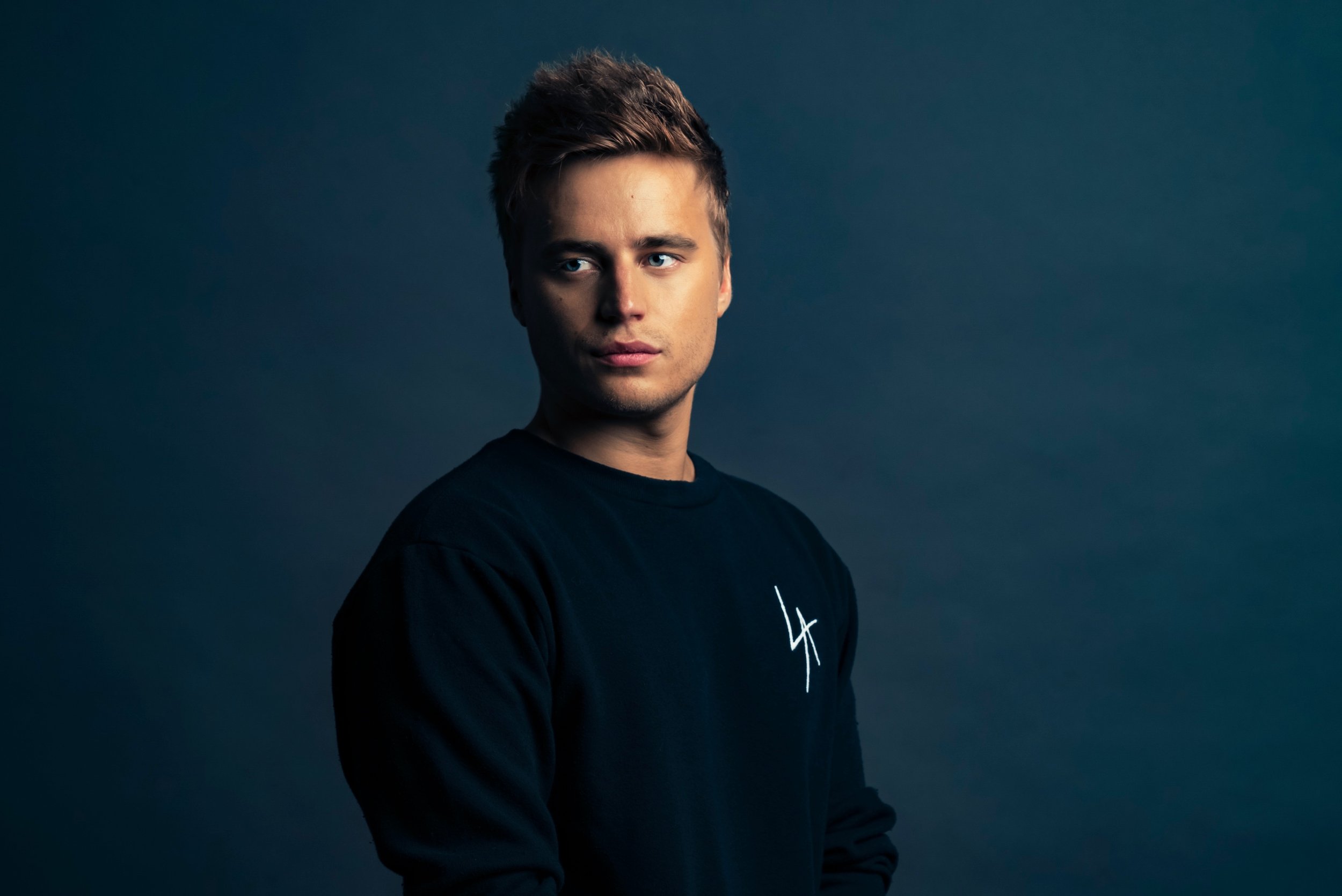
Klingande has always made music that feels like a breeze—something warm, melodic, and easy to escape into, but in 2025, joy sounds different to him. Opening up about his journey in this EDMNOMAD exclusive interview, he reveals how joy is not smaller, not less powerful—just more real. “I think joy, for me, has always been about feeling carefree — like, just being able to let go,” he says. “Not overthinking, just enjoying the moment. That’s what I’ve always tried to put in my music — this feeling of freedom and lightness.”
The joy he’s known for hasn’t disappeared—it’s evolved. “Of course, in the beginning it came out as those tropical, sunny sounds. But now, I feel like it’s evolving,” he continues. “Joy still has that warmth, but there’s maybe more emotion, more depth in what I create. I want it to feel a bit more mature, I guess, while still keeping that uplifting spirit.” That change is personal too. “I used to find joy in big moments — shows, crowds, that rush. I still love that,” he shares. “But today, I also find it in much simpler things. That balance is really important to me now, and I think the music reflects that too.”
Nightlife and the Need to Keep Evolving
Looking at 2025, Klingande rolls out his latest release, Nightlife, marking a bold shift into future house—far from the tropical signature of Jubel. But he doesn’t see it as a reinvention. “Nightlife isn’t necessarily going to define a new era for Klingande, but it reflects my ongoing desire to explore and evolve,” he says. “Since the beginning, I’ve never wanted to be stuck in one sound. Every song I release is part of a bigger journey — a step in my artistic evolution.”
Even in its club-focused sound roaring the dance floors in 2025, Nightlife retains the signature Klingande acoustic DNA. “There’s always going to be an acoustic, emotional core in what I do. Like in Nightlife, you can still hear the guitar and that more organic feeling,” he explains. “I don’t try to fit into one style. I just want to create what feels good and honest to me.”
That honesty extended to how the track came together. “I met Koates during a writing session where we worked on a song together,” he recalls. “A month later, he sent me a demo he had just written — and that demo became Nightlife.” The connection was instant. “I immediately connected with the energy and vibe of the track. It just made sense with what I was exploring musically at that time.” The decision to release the track through Ultra Records also came naturally. “Releasing it with Ultra Records also felt right. Given the more electronic, club-oriented feel of the track, it was a great fit for this release.”
Klingande Opens Up On Chasing Jubel and the Truth About Fame in 2025 EDM
The pressure to follow a global hit is rarely talked about—but it lingers long after the charts move on. For Klingande, Jubel was both a launchpad and a looming benchmark. More than a decade later, he’s still untangling how it shaped his sense of success. “When Jubel came out, it was right at the beginning of my career — and having a hit like that so early on, it creates this huge rush,” he says. “Naturally, you want to feel that again. I think I spent a lot of time chasing that same kind of moment, trying to recreate that excitement and energy.”
That kind of momentum is addictive—but also quietly destructive. Only with time did he start to recognize how much of his creative drive was being shaped by external voices. “With time, I realized that putting so much pressure on myself, and listening too much to outside noise — what people expect, what the industry wants — it can really throw you off,” he admits. “I think I would’ve been better off trusting myself more from the start, and not letting others shape the path too much.”
For many artists, this realization comes too late. But Klingande managed to spot it before the cycle consumed him. “That constant search for success can start to take over your whole life if you’re not careful,” he says. “You can end up feeling more alone, more anxious about the future. It’s important to protect your personal life, to stay grounded, and remember that you’re more than just the next track or the next tour.”
The pandemic gave him that pause—and unlike others who saw it only as a disruption, Klingande saw a way forward. “The pandemic was a major turning point for me. It gave me the chance to slow down and reflect — something I hadn’t really done since the start of my career,” he says. “Even before that, I had already started thinking about stepping back from constant touring. I needed a better balance, more routine, and space for other parts of life. That period helped me reconnect with people and with what matters outside of music.”
He describes it as a “quieter moment, but a really important one — it changed how I see my career and how I want to move forward.” And that quiet may be the most defining thing Klingande has embraced in the last decade—not as retreat, but as intention.
Live Instruments, Intimate Shows, and Emotional Honesty
While some DJs in 2025 rely on pre-programmed sets and dazzling visuals, Klingande still chooses to share the stage—not with LED screens, but with live musicians. It’s not just about aesthetics. For him, it’s about emotion. “The live element is essential to me. I don’t enjoy performing as much without it — I feel a bit exposed,” he says. “When I have a musician on stage, it brings energy, spontaneity, and emotion. It makes the show more alive and interactive.”
This pursuit of aliveness is more than nostalgia for analog days—it’s his way of bringing humanity back into dance music. In 2025, a world of sonic perfection and pixel-perfect drops, Klingande still finds beauty in imperfection. “Hearing real instruments, with all their rawness and imperfections, brings something honest and beautiful to the music,” he reflects. “It creates a contrast to the polished electronic elements, and I think that authenticity is important today.”
He’s taken this approach even further, performing with full bands on special occasions. “Performing with a full band has always been a dream of mine,” he says. “I’ve had the chance to do it a few times, with drums, guitars, sax, violin, harmonica, vocals, and trumpet. Those were unforgettable moments, and I’d love to keep exploring that direction.”
These moments aren’t just novelty—they’re foundational to Klingande and his evolving identity throughout 2025. Where some artists strip back for intimacy, Klingande builds up. But not for spectacle—for soul. “In smaller, more intimate venues — especially when I’m performing with live musicians like the sax or violin — there’s a deep connection with the crowd,” he says. “I can see faces, smiles, and really feel the moment. That’s where I feel most ‘at home.’”
Ironically, despite the scale, big festival stages come with less weight on his shoulders. “Festivals, on the other hand, are massive — the energy is unbelievable, the visuals, the production… it’s an amazing rush,” he admits. “Ironically, I sometimes feel less pressure there, because people are coming for the whole experience, not just for me. Both formats push me in different ways.”
Klingande on Legacy, Light, and Long-Term Creativity Beyond 2025
Looking at the releases in 2025, many DJs explore darker and harder sounds, but refreshingly Klingande remains focused on uplifting energy. “I totally get why a lot of DJs are going for darker or heavier stuff — it can be super powerful on a dancefloor,” he says. “And even in my own sets, I sometimes play things that are stronger or more intense.”
But he knows what really matters to him. “If I’m honest, the music I enjoy the most — whether it’s what I listen to in my car, or what I play during certain parts of my sets — it’s always going to be more on the joyful side,” he says. “Something softer, emotional, with a good vibe.” He’s not the only one who notices that shift onstage. “I’ve noticed, when I play those songs live that those are the moments when I really feel connected, when I enjoy myself the most on stage,” he reflects. “That kind of happy, uplifting energy — not too aggressive, but still full of life — that’s what I love bringing to people.”
Outside of music, he stays grounded by taking time away. “As an introvert, I recharge by slowing everything down. Being at home, enjoying simple moments, helps me reset,” he says. “I also still love being in the studio when inspiration returns — it never feels like work when it comes naturally.” Curiosity fuels his creativity. “Every year I try to discover new passions. None of them have ever been as powerful as music for me, but they all inspire me in different ways,” he shares. “I think that curiosity helps me stay fresh and creative, without feeling like I’m forcing anything.”

And when he thinks about the future beyond 2025, Klingande hopes his music—and his story—mean something lasting. “I hope they feel inspired to stay true to themselves,” he says. “That they see my path and understand that it’s okay to take your time, to grow at your own pace, and not to follow every trend.” His message is simple, but it carries weight. “You can make people dance and still touch something deeper.” And most of all: “It’s still worth slowing down and building something meaningful — something that lasts, not just something that works for a moment.”
In a scene that too often rewards immediacy over intention, Klingande offers a different kind of blueprint—one built on balance, emotional honesty, and joy that doesn’t demand attention but earns it. His music isn’t chasing the moment; it’s creating space for it. And in doing so, he reminds us that dance music doesn’t always have to be louder or darker to be powerful. Sometimes, the quietest truths leave the deepest impact.
Follow his journey here.
